Your cart is currently empty!
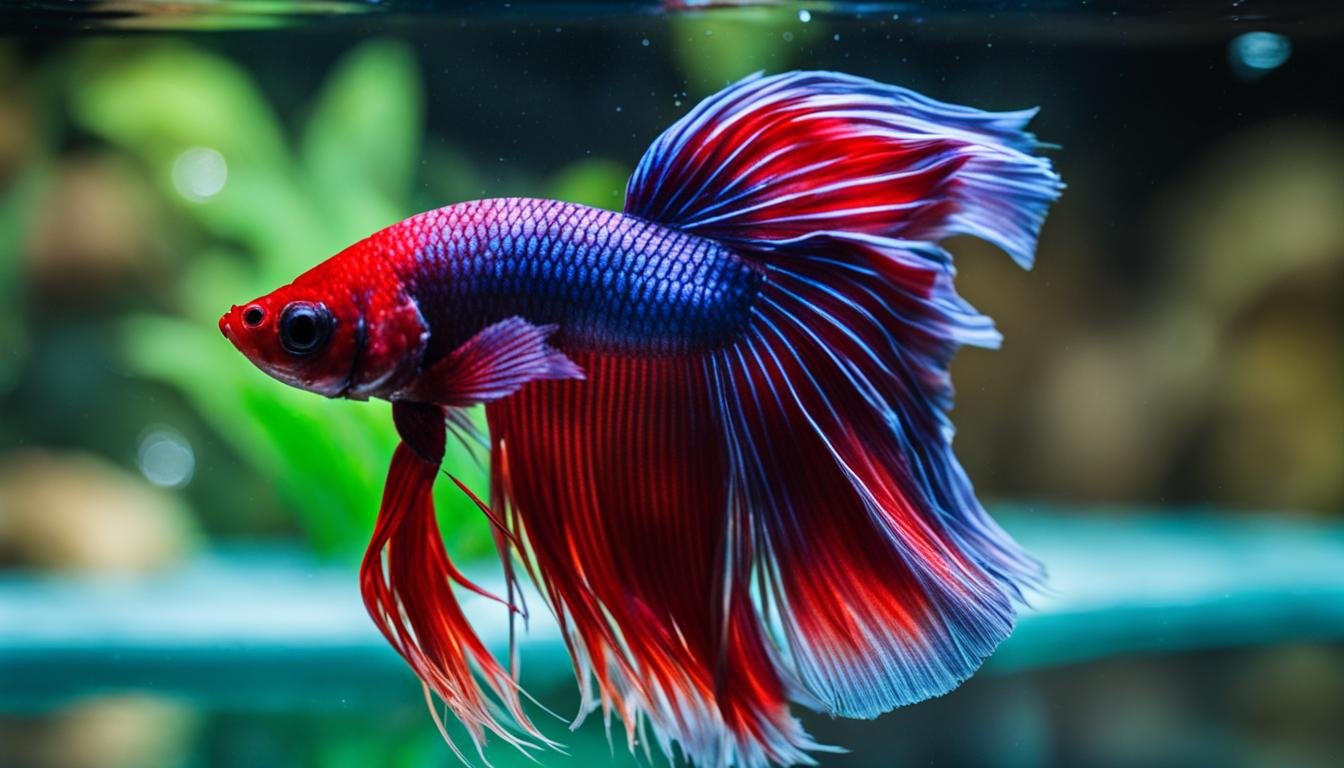
How Often Should You Feed A Betta Fish Bloodworms? Find Out Here!
A Betta fish’s nutrition is crucial to its overall well-being. These vibrant and beautiful fish require a diet that is high in protein to thrive and maintain their vibrant coloration. In the wild, Betta fish feed on aquatic worms and fallen insects, so it is important to provide them with similar food options in captivity.
When it comes to feeding Betta fish bloodworms, it is essential to strike a balance and ensure proper feeding frequency. In this article, we will explore the best diet for Betta fish, the recommended feeding schedule, and how often you should feed them bloodworms.
Key Takeaways:
- Proper nutrition is vital for Betta fish’s vibrant coloration and overall well-being.
- Betta fish require a diet high in protein, as they thrive on aquatic worms and fallen insects in the wild.
- Introducing one new food each week can help provide a varied diet for your Betta fish.
- Betta fish cannot survive on a diet solely comprised of vegetables or plant roots.
- A healthy and diverse diet contributes to the overall health of Betta fish.
Nutritional Needs of a Betta
A Betta fish has specific nutritional needs that are essential for its overall health and well-being. Providing a balanced diet that includes the right vitamins, minerals, carbohydrates, and proteins is crucial to ensure a thriving Betta fish.
Vitamins play a vital role in enhancing a Betta fish’s disease resistance and preventing anemia. Look for frozen or live Betta food that is rich in vitamins to incorporate into their diet.
Minerals are essential for regulating fluid balance in the Betta fish’s body. Formulated Betta pellets often contain minerals that are necessary for their overall health.
Carbohydrates are a source of energy for Betta fish and aid in disease prevention. It is important to provide carbohydrates in moderation to avoid overfeeding and maintain a healthy diet for your Betta fish.
Proteins are crucial for the energy, tissue development, and bone formation of Betta fish. Betta fish thrive on live foods that are protein-rich, such as black worms, bloodworms, and daphnia.
Meeting the Nutritional Needs:
- Include frozen or live Betta food that is rich in vitamins to promote disease resistance and prevent anemia.
- Choose formulated Betta pellets that contain essential minerals to regulate fluid balance in their body.
- Provide carbohydrates in moderation to prevent overfeeding and aid in disease prevention.
- Incorporate protein-rich live foods like black worms, bloodworms, and daphnia to support energy, tissue development, and bone formation.
Recommended Food for Betta Fish
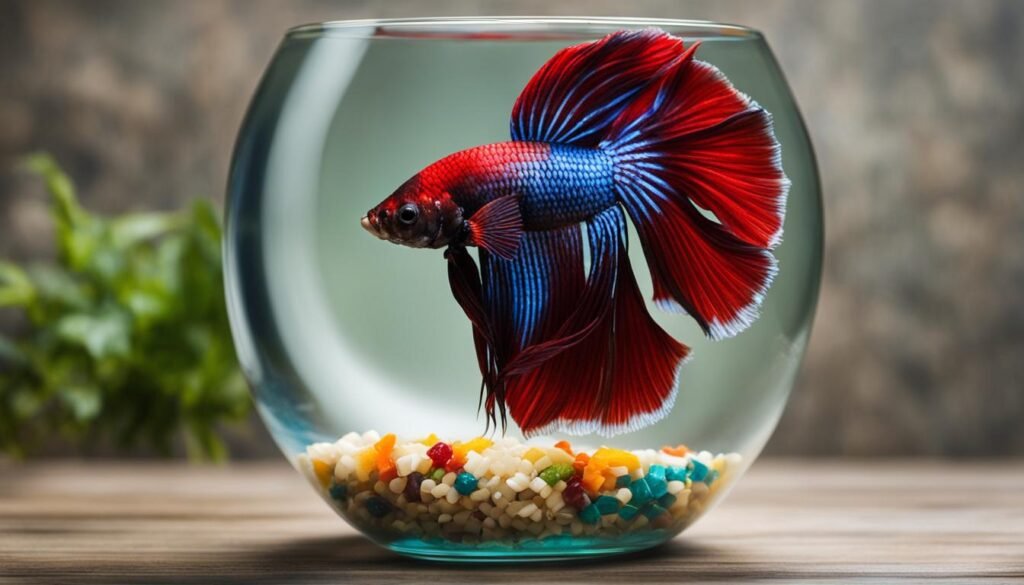
When it comes to feeding your Betta fish, it’s important to choose the right food that meets their nutritional needs. A well-balanced diet contributes to their overall health and vibrant colors. Here are some food recommendations for Betta fish:
- Protein-rich food: Betta fish require a diet that is high in protein. Options such as live black worms, bloodworms, and daphnia are excellent choices as they mimic their natural diet in the wild.
- Fibrous food: In addition to protein, Betta fish benefit from fibrous foods that aid in digestion. Fiber-rich options like brine shrimp provide the necessary roughage to keep their digestive system functioning properly.
- Frozen and freeze-dried food: Frozen bloodworms and brine shrimp are convenient options that can be stored until needed. These types of food retain much of their nutritional value and provide a variety of feeding experiences for your Betta fish.
- Dry food: While dry foods should be used sparingly, they can still be included in a Betta fish’s diet. Look for high-quality pellets or flakes that are specifically formulated for Betta fish. These dry foods often contain a mix of proteins, vitamins, and minerals to support their overall health.
Remember to offer a varied diet to your Betta fish by rotating different types of food. This will ensure they receive a wide range of essential nutrients and stay healthy. Keep in mind that protein should be the primary ingredient in their diet, followed by fibrous options for digestion. Find the right balance that works for your Betta fish and observe their behavior and appearance to ensure they are thriving.
Choosing the Right Food:
To provide the best nutrition for your Betta fish, consider the following factors when selecting their food:
- Quality ingredients: Look for high-quality fish food that contains real protein sources like fish meal or shrimp. Avoid food with fillers and artificial additives.
- Age and size: Betta fish have different nutritional needs depending on their age and size. Younger fish may require more protein and smaller-sized pellets, while older fish may benefit from larger pellets or flakes.
- Feeding behavior: Pay attention to your Betta fish’s feeding behavior. If they consistently refuse or spit out certain types of food, try experimenting with different options to find what they prefer.
- Water clarity: Certain types of food can cloud the water and affect its clarity. Opt for food that doesn’t disintegrate quickly and create unnecessary waste in the tank.
By considering these factors and providing a well-balanced diet, you can ensure your Betta fish stays healthy and happy. Always monitor their behavior and make adjustments to their diet as needed. Remember, a nourishing diet is key to maintaining their vibrant colors and overall well-being.
Proper Feeding Portions for Betta Fish
Feeding your Betta fish the proper portions is essential for their overall health and well-being. Overfeeding can lead to complications such as constipation and water contamination, while underfeeding can result in nutritional deficiencies. To ensure your Betta fish receives the right amount of food, follow these guidelines:
- Portion size: Feed your Betta fish small amounts of food at each feeding. A general rule of thumb is to offer an amount no larger than the size of your Betta’s eyeball. This can be approximately 3 bloodworms or 3 soaked pellets per feeding. Adjust the portion size based on how much your Betta consumes within a few minutes.
- Feeding frequency: Betta fish should be fed twice a day, with each feeding spaced approximately 12 hours apart. This allows for proper digestion and prevents overfeeding. Consistency is key, so try to establish a feeding schedule and stick to it.
- Monitoring: Observe your Betta fish during feeding to gauge their appetite and eating habits. If they consistently leave food uneaten, reduce the portion size to prevent water contamination. On the other hand, if your Betta finishes their food quickly and appears hungry, you may need to slightly increase the portion size.
Finding the Right Balance
Finding the proper feeding portions for your Betta fish may require some trial and error. It is important to strike a balance between providing enough food for your Betta’s nutritional needs and avoiding overfeeding. Remember that Betta fish have small stomachs and can become bloated if fed excessively. By closely monitoring their behavior and adjusting the portion size accordingly, you can ensure your Betta fish remains healthy and happy.
Risks of Overfeeding Bloodworms to Betta Fish
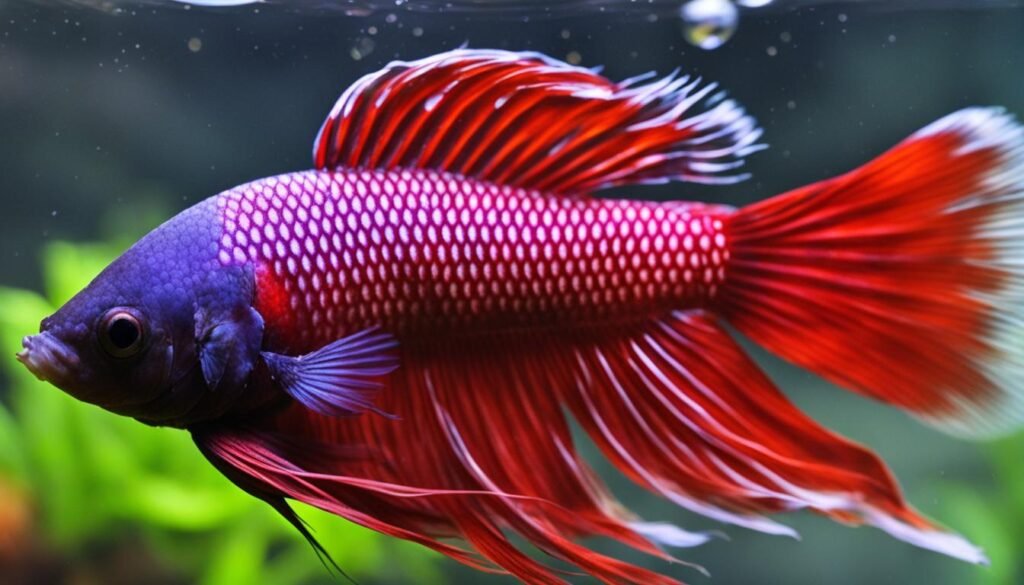
While bloodworms can be a nutritious and tasty treat for Betta fish, overfeeding them can lead to various health issues. It is important to understand the risks associated with overfeeding to ensure the well-being of your Betta fish.
Swim Bladder Disorder
One of the risks of overfeeding Betta fish with bloodworms is the development of swim bladder disorder. This condition affects the fish’s swim bladder, a small organ that helps them control their buoyancy. When a Betta fish consumes too much food, especially high-fat foods like bloodworms, it can lead to bloating and a disruption in the swim bladder’s functionality. This can cause the fish to have difficulty swimming and maintaining its balance.
Constipation
Another common issue associated with overfeeding bloodworms is constipation. Bloodworms are high in fats, and excessive consumption can lead to digestive problems, including constipation. Constipated Betta fish may exhibit signs of discomfort, such as a bloated abdomen, decreased appetite, and irregular bowel movements. If left untreated, constipation can further impact the fish’s overall health and well-being.
Water Contamination
Overfeeding bloodworms can also contribute to water contamination in the Betta fish tank. When uneaten food remains in the tank, it can decompose and release harmful compounds into the water, such as ammonia. Elevated levels of ammonia can be toxic to fish and lead to poor water quality, which can negatively affect the health and longevity of your Betta fish.
To prevent these risks, it is essential to establish a balanced feeding routine for your Betta fish and monitor their food intake. Offer bloodworms in moderation and ensure they are just a part of a varied and nutritious diet. By being mindful of the risks and taking proactive measures, you can help your Betta fish thrive and stay healthy.
Factors Affecting Betta Fish’s Appetite for Bloodworms
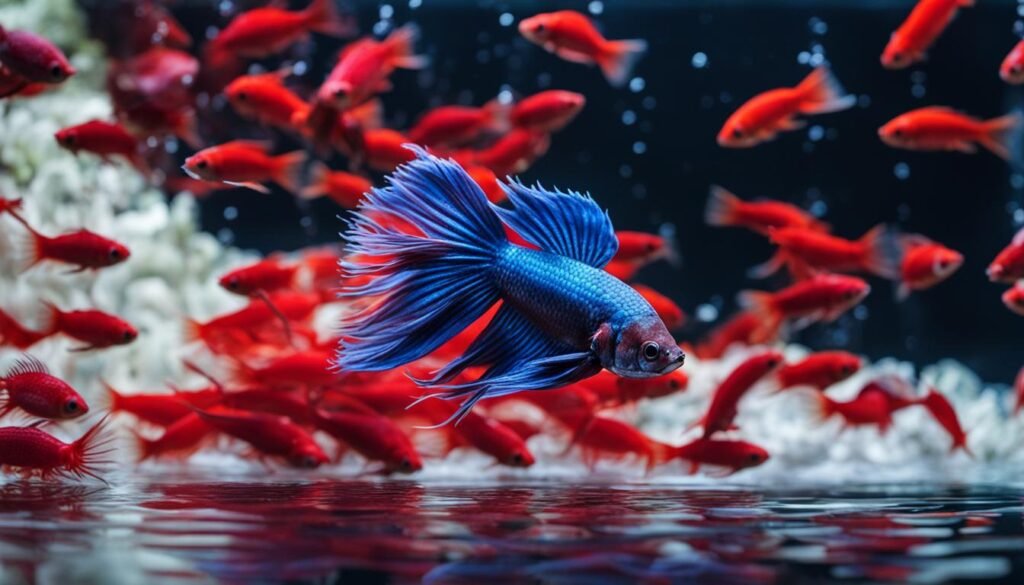
Feeding betta fish bloodworms can be a rewarding experience, but it’s important to understand that their appetite for this particular food can be influenced by various factors.
1. Stress
Betta fish can experience temporary loss of appetite when they are stressed. Factors such as tank cleaning, rehoming, or the presence of aggressive tank mates can lead to stress and a decreased interest in eating bloodworms.
2. Water Temperature
The water temperature in a betta fish’s tank plays a crucial role in their metabolism and appetite. If the water is too warm or too cold, it can affect their appetite for bloodworms. It’s important to maintain the recommended temperature range for betta fish, which is typically between 76°F and 80°F.
3. Age
As betta fish age, their activity levels may decrease, leading to a decrease in appetite. Older bettas may show less interest in bloodworms compared to younger ones. It’s essential to monitor your betta fish’s behavior and adjust their diet accordingly as they age.
4. Illness
Illness can also cause a loss of appetite in betta fish. If your betta fish is sick or recovering from an illness, they may not show interest in eating bloodworms. It’s crucial to address any health issues promptly and seek appropriate veterinary care if necessary.
Understanding these factors can help you better assess your betta fish’s appetite for bloodworms. It’s essential to provide a stress-free environment, maintain proper water temperature, and monitor their health to ensure a healthy appetite and overall well-being.
Types of Betta Fish Bloodworms

When it comes to feeding your Betta fish, bloodworms can be a nutritious and enticing option. There are three main types of bloodworms available for Betta fish: live bloodworms, freeze-dried bloodworms, and frozen bloodworms.
1. Live Bloodworms: Live bloodworms provide a natural and stimulating feeding experience for Betta fish. They mimic the Betta’s natural diet in the wild, and their movement can trigger hunting instincts. However, live bloodworms have a short shelf life and require proper care to avoid contamination risks.
2. Freeze-dried Bloodworms: Freeze-dried bloodworms are convenient to store and feed. They have a long shelf life and retain most of the nutrients found in live bloodworms. However, they have a lower nutritional value compared to live bloodworms.
3. Frozen Bloodworms: Frozen bloodworms offer a balance between nutrition and storage life. They are closer in nutritional content to live bloodworms compared to freeze-dried bloodworms. Frozen bloodworms can be easily portioned and thawed before feeding to your Betta fish.
Choosing the Right Bloodworms for Your Betta Fish
When selecting bloodworms for your Betta fish, consider factors such as convenience, nutritional value, and the specific needs of your fish. Live bloodworms provide a more natural feeding experience, while freeze-dried and frozen bloodworms offer convenience and longer shelf life. It’s important to vary your Betta’s diet by including other protein-rich foods to ensure a balanced nutrition. Observing your Betta’s behavior and health can help you determine which type of bloodworms they prefer.
Remember to feed bloodworms in moderation and monitor your Betta’s overall health to prevent overfeeding and associated complications. Providing a diverse diet that includes bloodworms along with other high-quality foods will contribute to the well-being and vibrant colors of your Betta fish.
Proper Preparation and Feeding Methods for Bloodworms
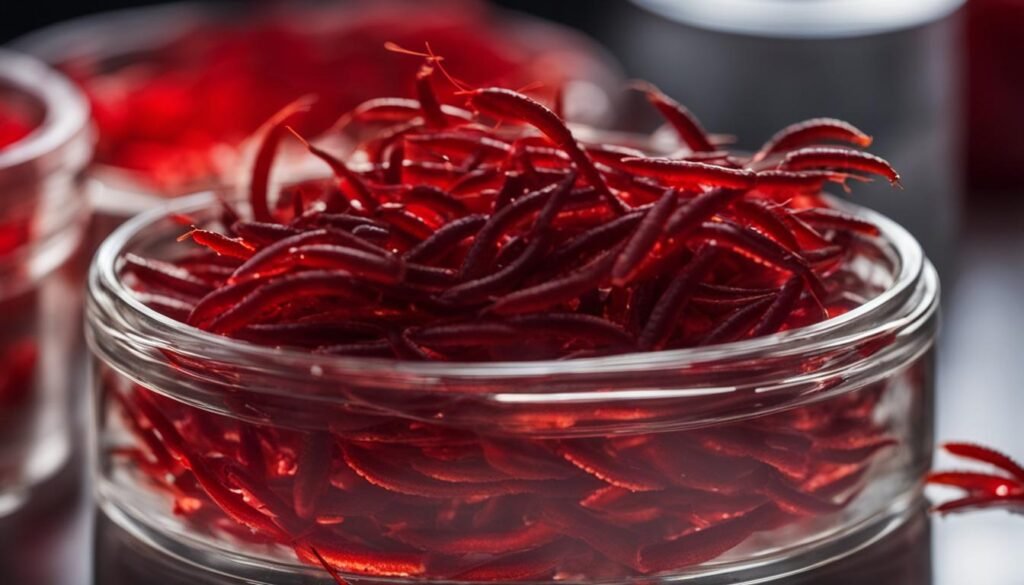
Properly preparing and feeding bloodworms to your Betta fish is essential for their health and well-being. Whether you choose live, frozen, or freeze-dried bloodworms, following the correct methods will ensure your Betta fish receives the necessary nutrition without any negative side effects.
Preparation of Bloodworms for Betta Fish
If you opt for live bloodworms, it is crucial to rinse them thoroughly before feeding them to your Betta fish. This helps remove any debris or potential parasites that may be present. Additionally, live bloodworms should be sourced from reputable suppliers to minimize the risk of contamination.
For frozen bloodworms, defrosting them before feeding is necessary. Divide the frozen bloodworms into smaller portions and allow them to thaw in a separate container of aquarium water. This prevents any waste from contaminating the main tank.
When using freeze-dried bloodworms, soak them in water for a few minutes to allow them to expand before feeding. This rehydration process makes it easier for your Betta fish to consume the bloodworms and aids in digestion.
Feeding Methods for Bloodworms
When feeding bloodworms to your Betta fish, it is important to offer them in small increments. Overfeeding can lead to water contamination and health issues such as constipation. Feed your Betta fish an amount that they can consume within a few minutes, and remove any uneaten bloodworms from the tank promptly.
You can use feeding tools such as tweezers or a feeding cone to make it easier to deliver the bloodworms directly to your Betta fish. This helps prevent the bloodworms from sinking to the bottom of the tank and potentially fouling the water.
Remember to vary your Betta fish’s diet by incorporating other protein-rich foods alongside bloodworms. This ensures they receive a balanced and nutritious diet, contributing to their overall health and vitality.
Potential Risks and Complications of Feeding Bloodworms to Betta Fish
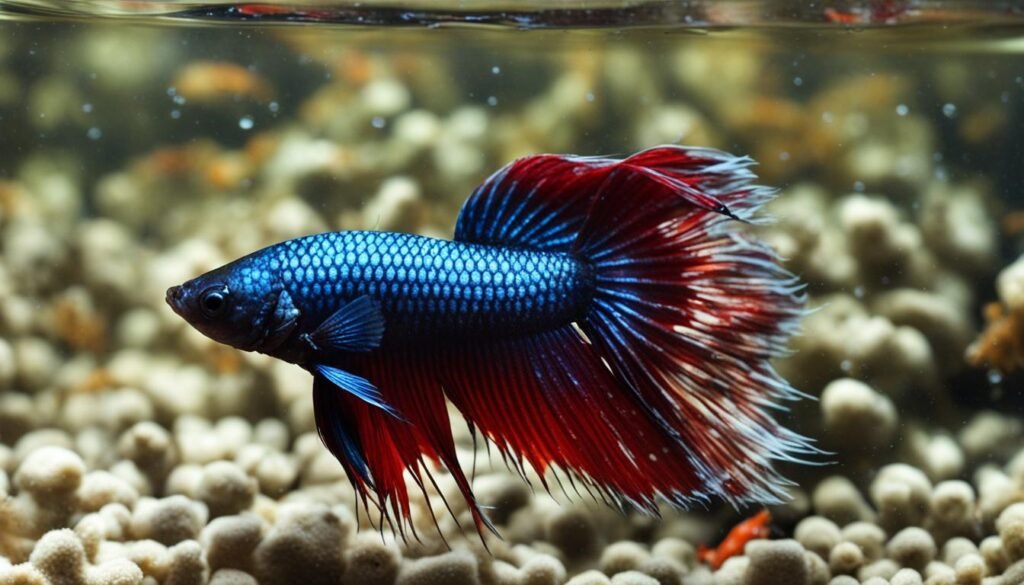
Feeding bloodworms to Betta fish can offer numerous benefits, but it’s important to be aware of the potential risks and complications associated with this type of diet. Understanding these risks will allow you to properly care for your Betta fish and ensure their well-being.
Risks of feeding Betta fish bloodworms:
- Ammonia spikes in Betta fish tank: Overfeeding bloodworms can lead to excessive waste, resulting in increased ammonia levels in the tank. High ammonia levels can be harmful to the fish and negatively affect their health.
- Constipation in Betta fish: Bloodworms are high in fats, and overfeeding can cause constipation in Betta fish. This can lead to bloating, discomfort, and potential digestive issues.
- Parasites in bloodworms: Bloodworms, especially live ones, can carry parasites that can infect Betta fish. It’s important to source bloodworms from reputable suppliers and properly clean them before feeding to minimize the risk of introducing parasites to your fish.
To avoid these complications, it’s crucial to maintain a balanced diet for your Betta fish. Bloodworms should be fed in moderation, alongside other nutritious foods such as pellets, frozen or live foods, and occasional vegetables. Monitoring your Betta fish’s behavior, water quality, and overall health will help you identify any issues early on and make necessary adjustments to their diet.
Conclusion
In conclusion, maintaining a healthy and balanced diet for your Betta fish is essential for their overall well-being. Bloodworms can be a valuable part of their diet, but it’s crucial to feed them in moderation. Optimal bloodworm feeding frequency should be twice a week, along with other protein-rich foods.
Caring for your Betta fish goes beyond just their diet. Ensure that you provide them with a clean and suitable environment, maintaining proper water temperature and quality. Regular observation of your Betta’s behavior and health will help you make necessary adjustments to their diet and care routine.
Remember, a healthy Betta fish diet consists of a variety of foods, including live, frozen, and dry options. Offering a mix of protein-rich foods, fibrous options, and essential vitamins and minerals will support their vibrant coloration and overall vitality.
By following these betta fish care tips and providing a well-rounded diet, you can ensure that your Betta fish thrives in their aquatic home, bringing joy and beauty to your life.
FAQ
How often should you feed a Betta fish bloodworms?
Betta fish should be fed bloodworms in moderation, typically 2-3 times a week as part of a varied diet.
What are the nutritional needs of a Betta fish?
Betta fish require vitamins, minerals, carbohydrates, and proteins to maintain their health and well-being.
What is the recommended food for Betta fish?
Betta fish thrive on live foods such as black worms, bloodworms, and daphnia, as well as frozen options like bloodworms and brine shrimp.
How much should you feed a Betta fish?
A general guideline is to feed your Betta fish no more than the size of its eyeball per feeding, approximately 3 bloodworms or 3 soaked pellets.
What are the risks of overfeeding bloodworms to Betta fish?
Overfeeding bloodworms can lead to swim bladder disorder, constipation, and water contamination, which can negatively affect the health of Betta fish.
What factors can affect a Betta fish’s appetite for bloodworms?
Stress, incorrect water temperatures, age, illness, and individual preferences can all influence a Betta fish’s appetite for bloodworms.
What are the types of Betta fish bloodworms?
There are live bloodworms, freeze-dried bloodworms, and frozen bloodworms available for feeding Betta fish.
How should bloodworms be prepared and fed to Betta fish?
Live bloodworms should be rinsed before feeding, frozen bloodworms should be defrosted, and freeze-dried bloodworms should be soaked before serving to Betta fish.
What are the potential risks and complications of feeding bloodworms to Betta fish?
Overfeeding bloodworms can cause ammonia spikes, constipation, and bloodworms can carry parasites that can infect Betta fish.
What is the optimal bloodworm feeding frequency for Betta fish?
Bloodworms should be fed 2-3 times a week, as part of a balanced and varied diet for Betta fish.
Leave a Reply